MercoPress. South Atlantic News Agency
Antarctica
-
Friday, February 14th 2014 - 07:24 UTC
Live Antarctic Search and Rescue Exercise by IAATO in conjunction with Ushuaia
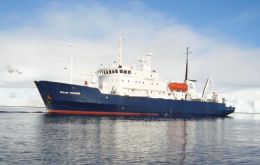
The International Association of Antarctica Tour Operators (IAATO) and two IAATO Member Operators, Aurora Expeditions and Oceanwide Expeditions, took part in a live Search and Rescue Communications Exercise in collaboration with the Maritime Rescue Coordination Center (MRCC) Ushuaia, Argentina.
-
Saturday, January 18th 2014 - 05:41 UTC
HMS Protector surveying previously unchartered waters off Sandwich Islands

Previously uncharted areas of the Southern Ocean have been surveyed by personnel on board Royal Navy ice patrol ship HMS Protector. Using its multi-beam echo sounder the ship gathered data off the Sandwich Islands along areas of the Douglas Straits between South Thule and Cook Island for the UK Hydrographic Office to fill in missing data in the Admiralty Charts.
-
Tuesday, January 14th 2014 - 13:12 UTC
South Georgia grey-headed albatross added to the 'endangered species' list

Encouraging and bad news for albatrosses: while the black-browed has been down-listed from 'near threatened' the grey-headed albatross is in rapid decline and considered “endangered” mainly because of fishing activities, reports the latest edition of the South Georgia Newsletter.
-
Monday, January 13th 2014 - 06:30 UTC
Busy November in South Georgia with 11 cruises, yachts and HMS Protector
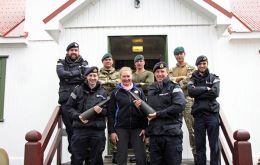
November was a busy month for cruise vessels: eleven cruise ships visited South Georgia between the 9th and 29th, according to the South Georgia Newsletter. One cruise ship, Ortelius, reached the rarely visited South Sandwich Islands and was able to put scientist Tom Hart ashore on Saunders Island where he took soil samples and set up two camera-traps to monitor the penguin colonies.
-
Monday, January 13th 2014 - 06:17 UTC
South Georgia will issue two-year licenses for toothfish and icefish
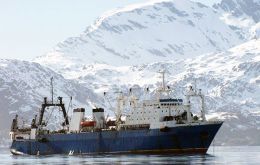
The government of South Georgia and South Sandwich Islands has announced it will issue two-year fishing licenses to companies who successfully apply to fish for toothfish and icefish in the SGSSI Maritime Zone, reports the South Georgia Newsletter latest edition.
-
Saturday, January 11th 2014 - 07:48 UTC
Russian vessel incident triggers debate on Antarctica growing tourist industry

The challenging rescue operation launched after a Russian ship became trapped in Antarctic pack ice in December shows the inherent risks facing the frozen continent's burgeoning tourist industry, experts say. Antarctica represents one of the last frontiers for adventurous travelers, an icy wonderland of glaciers, emperor penguins and seemingly endless white expanses.
-
Wednesday, January 8th 2014 - 05:25 UTC
Russian and Chinese vessels break loose from Antarctic ice
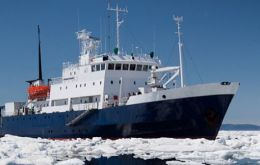
The Australian Maritime Safety Authority (AMSA) confirmed Wednesday that the entrapped Antarctic ships, the Akademik Shokalskiy and the Xue Long (Snow Dragon), have broken free from the ice in Antarctica and are no longer in need of assistance.
-
Wednesday, January 8th 2014 - 01:00 UTC
IAATO expedition vessel helps HCA chart Antarctic waters

An IAATO sailing yacht has demonstrated that private and commercial vessels on expeditions in Antarctica can perform official hydrographic surveys and produce navigational charts that are still much needed for the region. Results were presented at the 13th Conference of the Hydrographic Commission on Antarctica (HCA) in Cadiz, Spain 3-5 December, hosted by the Spanish Navy.
-
Sunday, January 5th 2014 - 14:41 UTC
US icebreaker sent to Antarctica to rescue Chinese and Russian trapped vessels
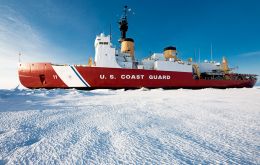
A U.S. Coast Guard heavy icebreaker left Australia for Antarctica on Sunday to rescue more than 120 crew members aboard two icebreakers trapped in pack ice near the frozen continent’s eastern edge, officials said. The 122-meter cutter, the Polar Star, is responding to a Jan. 3 request from Australia, Russia and China to assist the Russian and Chinese ships.
-
Friday, January 3rd 2014 - 14:43 UTC
Chinese icebreaker trapped in Antarctica after rescuing passengers from Russian vessel
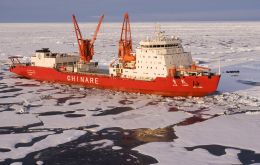
The Chinese icebreaker that helped rescue 52 passengers from a Russian ship stranded in Antarctic ice found itself stuck in heavy ice, further complicating the 9-day “roller-coaster” rescue operation. “Snow Dragon” (Xue Long) had ferried the passengers from the stranded Russian ship to an Australian icebreaker late on Thursday.
